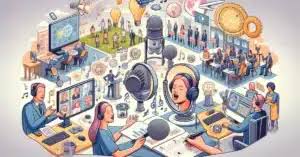The ability of cloning your voice and to mimic human speech has long fascinated science fiction. From the dulcet tones of HAL 9000 in “2001: A Space Odyssey” to the chilling utterances of Arnold Schwarzenegger’s Terminator, these fictional portrayals reflected the desire to understand and potentially manipulate the human voice. Today, science fiction is fast becoming science fact. Artificial intelligence (AI) is making significant advances in voice cloning, with applications ranging from entertainment to accessibility. This article explores the current state of AI voice cloning in 2024, its potential benefits and drawbacks, and the ethical considerations surrounding this powerful technology.

How does AI Cloning your voice?
Voice cloning, also known as voice synthesis or voice mimicry, uses AI algorithms to analyze a person’s recorded speech. These algorithms break down the speaker’s vocal characteristics, including pitch, timbre, intonation, and pronunciation patterns. Once the AI has learned these features, it can synthesize new speech that sounds strikingly similar to the original voice, even if the synthesized speech says words or phrases never uttered before.
There are two main approaches to AI speech cloning:
- WaveNet-based methods: These methods use a complex neural network architecture called WaveNet to directly generate audio waveforms that closely resemble the target voice. This approach can produce very high fidelity voice clones, but often requires a large amount of training data from the target speaker.
- Parametric methods: These methods learn a statistical model of the speaker’s voice and use this model to synthesize speech. Parametric methods generally require less training data than WaveNet-based methods, but the resulting speech clones may not be as high fidelity.

The Growing Applications of Voice Cloning
AI voice cloning is finding applications in a variety of fields:
- Entertainment: Voice cloning can be used to create realistic voiceovers for movies, video games, and audiobooks. It can also be used to revive the voices of deceased actors or singers for special projects.
- Accessibility: Voice cloning technology can be a boon for people who have lost their voices due to illness or injury. AI-generated voices can allow them to communicate more easily and regain a sense of independence.
- Customer Service: Companies can use voice clones to create more realistic and personalized customer service interactions. For example, a virtual assistant could use a cloned voice to answer customer questions or provide product information.
- Education and Training: AI-generated voices can be used to create customized language learning tools or to provide narrated educational materials in multiple languages.
- Content Creation: Content creators such as YouTubers or podcasters can use voice cloning to create different voice characters or enhance their existing content.
The Ethical Concerns of Voice Cloning
While the potential benefits of AI voice cloning are significant, there are also ethical issues to consider. These concerns include:
- Deepfakes and Disinformation: Voice cloning technology could be misused to create deepfakes, which are realistic-looking or realistic-sounding videos or audio recordings that have been manipulated to make it appear as if someone said or did something they never did. Deepfakes can be used to spread misinformation or damage someone’s reputation.
- Privacy Issues: The widespread use of voice cloning technology raises privacy concerns. How will voice data be collected and stored? Who will have access to it?
- Consent and Control: If someone’s voice is cloned, who has the right to control how it is used? Should people have the right to opt out of having their voices cloned?

The Future of AI Voice Cloning
As AI technology continues to develop, voice cloning capabilities will become increasingly sophisticated. Voice clones are likely to become even more difficult to distinguish from real human voices. This increases the importance of addressing the ethical concerns surrounding this technology. Industry regulations and standards may be needed to ensure that voice cloning is used responsibly and ethically. Only then will we be able to harness the full potential of this technology for good.
AI voice cloning is a powerful technology with the potential to revolutionize the way we interact with machines and information. However, it is also important to be aware of the potential downsides of this technology. As we move forward, it is crucial to have open discussions about the ethical implications of voice cloning and to develop safeguards to ensure its responsible use.
Check more news at NEXA

